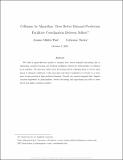Collusion by Algorithm: Does Better Demand Prediction Facilitate Coordination Between Sellers?
Author(s)
Miklós-Thal, Jeanine; Tucker, Catherine
DownloadSubmitted version (330.8Kb)
Open Access Policy
Open Access Policy
Creative Commons Attribution-Noncommercial-Share Alike
Terms of use
Metadata
Show full item recordAbstract
© 2019 INFORMS. We build a game-theoretic model to examine how better demand forecasting resulting from algorithms, machine learning, and artificial intelligence affects the sustainability of collusion in an industry. We find that, although better forecasting allows colluding firms to better tailor prices to demand conditions, it also increases each firm's temptation to deviate to a lower price in time periods of high predicted demand. Overall, our research suggests that, despite concerns expressed by policy makers, better forecasting and algorithms can lead to lower prices and higher consumer surplus.
Date issued
2019Department
Sloan School of ManagementJournal
Management Science
Publisher
Institute for Operations Research and the Management Sciences (INFORMS)